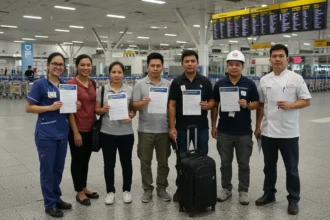In today’s competitive Philippine job market, a resume isn’t just a formality – it’s your personal advertisement. Recruiters spend an average of 7–10 seconds scanning a resume, which means you only get one shot to make an impression. The challenge is even tougher in the Philippines, where hundreds of applicants often compete for a single role.
- 📝 Understanding the Purpose of a Resume
- 📑 Key Sections Every Pinoy Resume Must Have
- 📊 Table 1: Common Resume Length by Job Level in PH
- 🎯 Crafting a Strong Career Objective
- 📊 Table 2: Action Verbs That Make Your Resume Pop
- 💡 Highlighting Skills That Employers Value
- 📷 Formatting: First Impressions Matter
- ✅ Common Resume Mistakes to Avoid
- ❓ Frequently Asked Questions (FAQ)
- ✨ Resumes as Your Passport to Opportunity
- 📄 References
But here’s the good news: writing a winning resume in the Philippines doesn’t have to be complicated. By understanding what HR managers look for, avoiding common mistakes, and presenting your skills effectively, you can stand out even without an extensive background. Let’s break it down step by step.
📝 Understanding the Purpose of a Resume
A resume is not your autobiography. It’s not meant to tell your entire life story, nor is it a formal school report. Instead, think of it as a strategic marketing tool – a short, sharp document designed to convince employers that you are worth calling for an interview.
Many Filipino job seekers make the mistake of:
- Writing resumes that are too long (3–5 pages filled with every detail).
- Filling them with generic phrases like “hardworking and honest.”
- Using stiff, overly formal formats that hide their personality.
But employers don’t want to read your whole history – they want to know if you can do the job they need done.
🎬 Your Resume as a “Highlight Reel”
Instead of treating it as a diary, imagine your resume as a movie trailer:
- Short enough to grab attention.
- Exciting enough to spark interest.
- Focused on your best highlights, not every single detail.
A strong resume should answer three questions right away:
- What you can do (Skills): Your technical and soft skills relevant to the role.
- What you have achieved (Results): Concrete accomplishments, ideally with numbers (e.g., “Increased sales by 20% in six months”).
- Why you’re a good fit (Relevance): Tailored to the specific job description, not a generic one-size-fits-all document.
📌 Pro Tip: If your resume does those three things clearly, you’ve already outperformed half the competition. Most applicants either overwhelm HR with clutter or undersell themselves with vague words.
📑 Key Sections Every Pinoy Resume Must Have
Filipino employers usually expect specific information on a resume. Missing these can make HR skip your application.
Core Resume Sections:
- Personal Information (Full name, phone, email – but avoid unnecessary details like religion or height unless required).
- Career Objective or Summary (Short, clear statement of what you bring to the table).
- Work Experience (Focus on achievements, not just duties).
- Education (List highest level, relevant training, or certifications).
- Skills (Technical, digital, and soft skills).
- References (Optional, but be ready if HR requests).
Some companies also value a clean, one-page format – especially for entry-level roles.
📊 Table 1: Common Resume Length by Job Level in PH
| Job Level | Ideal Resume Length | Notes |
|---|---|---|
| Fresh Graduate | 1 page | Focus on skills, internships, and projects |
| Mid-Level Professional | 1–2 pages | Highlight achievements, relevant jobs |
| Senior/Managerial | 2–3 pages | Emphasize leadership, measurable impact |
🎯 Crafting a Strong Career Objective
One of the most overlooked but powerful parts of a Filipino resume is the career objective or professional summary. This is usually the first thing HR managers read after your name and contact details. Done wrong, it makes you blend in with hundreds of other applicants. Done right, it positions you as the perfect match for the job even before they scan your experience.
Unfortunately, many applicants still write generic lines like:
- “To gain employment in a company where I can use my skills.”
- “To apply for a position where I can grow and contribute to the organization.”
These statements focus too much on what the applicant wants and not on what the company needs.
✅ Examples of Weak vs. Strong Objectives
Weak:
👉 “To apply my skills in any position that fits my qualifications.”
- ❌ Too vague.
- ❌ Shows desperation instead of direction.
- ❌ Doesn’t connect to a specific role or industry.
Strong:
👉 “Results-driven customer service specialist with 3 years in BPO, skilled in conflict resolution and upselling. Seeking to bring high client satisfaction scores to [Company Name].”
- ✔ Specific role mentioned.
- ✔ Measurable experience and skills.
- ✔ Tailored to the company’s needs.
Another Example:
Weak:
👉 “To work in a company where I can learn and grow.”
Strong:
👉 “Detail-oriented accounting graduate with internship experience in payroll processing and financial reporting. Eager to contribute accuracy and efficiency to [Company Name]’s finance team.”
📝 Tips for Writing Your Objective
- Keep it short and sharp (2–3 sentences max). HR spends less than 10 seconds scanning your resume at first glance.
- Tailor it to the job description. Use keywords from the posting (“SEO campaigns,” “financial reporting,” “customer retention”) so it passes ATS (Applicant Tracking System) filters.
- Highlight your value, not your needs. Instead of saying “I want to grow,” show “I will help your company grow.”
- Mention numbers or achievements if possible. Even small wins like “Handled 50+ customer inquiries daily” can stand out.
📌 Think of your career objective as your “elevator pitch in writing.” In just a few lines, HR should already see who you are, what you can do, and why they should keep reading your resume.
📊 Table 2: Action Verbs That Make Your Resume Pop
| Weak Verbs | Strong Action Verbs |
|---|---|
| Worked on | Executed, Delivered |
| Helped with | Supported, Facilitated |
| Did | Managed, Achieved |
| Made | Created, Developed |
| Fixed | Resolved, Optimized |
💡 Highlighting Skills That Employers Value
In the Philippines, HR professionals don’t just look at where you studied or your job titles – they zero in on specific skills that prove you can handle the role. A common mistake job seekers make is being too vague, writing things like “computer literate” or “team player.” These phrases don’t tell recruiters what you can actually do. To stand out, you need to show clear, measurable hard skills and practical soft skills that employers value.
⚙️ Hard Skills (Technical Abilities)
Hard skills are your learned, job-specific abilities that can be measured or tested. These make your resume stronger because they’re concrete proof of what you can deliver.
- Microsoft Excel (Pivot Tables, Macros): Many HR teams and managers still value Excel mastery, especially in accounting, sales, or admin roles where data organization is key.
- Digital Marketing (SEO, Social Media Ads): With businesses moving online, skills in boosting websites and running Facebook/Google ads are in high demand.
- Data Entry Accuracy (WPM Speed): Fast and accurate typing is crucial in BPO, transcription, and clerical roles. Adding your exact WPM (e.g., 65 WPM with 98% accuracy) can give you an edge.
- Graphic Design (Canva, Adobe Photoshop): Even non-design jobs appreciate someone who can make a decent presentation or marketing material. For creative roles, these are baseline expectations.
📌 Pro Tip: Always quantify your hard skills. Instead of saying “Good in Excel,” write “Created automated sales reports in Excel using Pivot Tables and Macros.” That shows real application.
🤝 Soft Skills (People-Oriented Abilities)
Soft skills are your interpersonal strengths – the traits that show how you work with others and adapt to challenges. These are often what separates equally qualified candidates.
- Leadership and Initiative: Employers value someone who doesn’t just follow instructions but also takes the lead when needed. Even small leadership roles (like being a group project leader in school) count.
- Communication Skills: The ability to explain ideas clearly in English and Filipino is highly prized, especially in BPO, marketing, and management roles.
- Problem-Solving Ability: Companies want employees who can think critically, not just escalate every issue. Highlight times when you solved a client or workflow problem.
- Adaptability in High-Pressure Settings: In fast-paced industries (like BPO, retail, or healthcare), being calm and resourceful under stress is a huge plus.
📌 Pro Tip: Don’t just list soft skills – back them up with examples. Instead of “Good communication skills,” write “Presented weekly updates to clients and coordinated with cross-functional teams.”
📷 Formatting: First Impressions Matter
Your resume design speaks before your words do. Many Filipino resumes suffer from walls of text, inconsistent fonts, or outdated templates. HR managers want resumes that are clean, professional, and easy to read.
Formatting Rules to Follow
- Stick to 1–2 professional fonts (Arial, Calibri).
- Use consistent headings and bullet points.
- Save as PDF, not Word, to preserve layout.
- Avoid photos unless the company specifically asks.
Remember: simplicity is not boring – it’s professional.
✅ Common Resume Mistakes to Avoid
- ❌ Overly long resumes (HR won’t read them).
- ❌ Adding personal details (age, religion, weight, unless requested).
- ❌ Using generic objectives.
- ❌ Listing job duties without achievements.
- ❌ Typos or poor formatting.
Avoiding these simple mistakes could already put you ahead of half the applicants.
❓ Frequently Asked Questions (FAQ)
Q1: Should I include a photo in my resume in the Philippines?
Generally, no – unless the company requires it (like modeling or customer-facing jobs). A clean, text-based resume is more professional and avoids bias.
Q2: Do employers check references?
Yes, many do. Always make sure your references are aware and supportive before listing them. Some employers will directly call your previous supervisors.
Q3: Should fresh graduates still include extracurricular activities?
Yes. If you lack work experience, extracurriculars, volunteer work, or thesis projects can demonstrate teamwork, initiative, or leadership.
Q4: Is it okay to use Canva resume templates?
Yes, but customize them. Don’t just use a popular template as-is. Recruiters can tell when 20 applicants use the same design.
Q5: How far back should I list my work experience?
Typically, 10 years is enough. Focus only on relevant jobs that show skills useful to the role you’re applying for.
Q6: What file format should I use when submitting?
Always submit in PDF unless the employer specifies otherwise. This ensures your formatting stays intact across devices.
Q7: Should I list my GPA?
Only if you’re a fresh graduate and your GPA is strong (e.g., 1.75 or higher). For experienced professionals, it’s unnecessary.
Q8: How often should I update my resume?
Update it at least once a year or every time you complete a major project, certification, or role.
✨ Resumes as Your Passport to Opportunity
A resume is not just paper – it’s your passport to opportunities. In the Philippines, where job competition is fierce and qualifications vary, crafting a standout resume can make the difference between getting noticed and being overlooked.
The truth is, degrees and experience matter, but how you present yourself on paper matters just as much. A messy, generic, or outdated resume can sabotage even the most qualified candidate, while a clear, targeted, and professional resume can elevate even someone with limited experience.
But more than rules and formatting, the heart of a winning resume is this: showing employers your value. Highlight the skills that make you irreplaceable, the achievements that prove your impact, and the drive that sets you apart.
In a way, writing your resume is practice for the job itself: it requires clarity, effort, and self-awareness. It forces you to ask: What do I really bring to the table? And if you answer that honestly and confidently, employers will see it too.
So as you send out applications, remember – every line on your resume is an investment in your future. Make it count.
📄 References
-
Robert Walters PH – How to Write a Resume for the Philippine Market in 2025
-
Penbrothers – Essential Resume Skills for Job Seekers in 2025
-
Visaya KPO – How to Write Your First Job Resume as a Fresh Graduate
-
Yarra PH – Ultimate Resume Guide: Impress Employers Locally & Internationally
-
Facebook BFPPH Group – Resume tips for 2025 to stand out
-
Reddit r/phcareers – What is the best Resume Template for Filipino Recruiters










